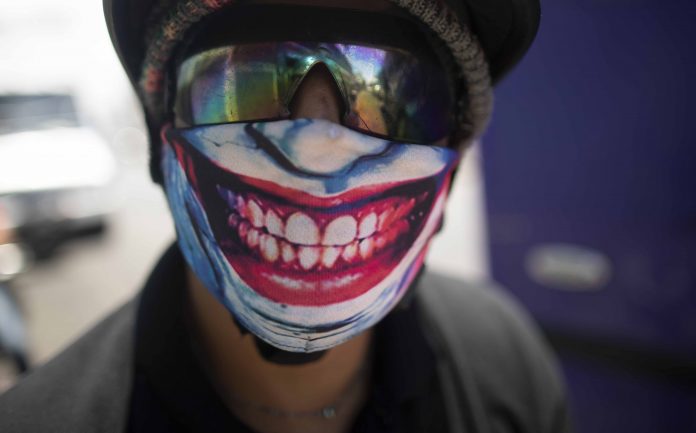
Rarely used in Latin America outside hospitals before the coronavirus pandemic, face masks are now compulsory for subway riders, supermarket shoppers and even joggers in some countries — and they’re becoming a colorful part of the region’s daily life.
Motifs showing up on masks are varied, often reflecting local cultures. There are lucha libre-themed masks in Mexico, logos of soccer clubs in Argentina, Batman characters in Peru and colorful swimsuit prints in Colombia.
Some activists sport masks with political statements.
“It’s a garment that has a strong visual impact,” says Lauren Fajardo, one of the owners of Cuban fashion brand Dador. “It is also a way to express yourself. I don’t even have to talk for someone to see what I’m trying to say with my face mask.”
When the virus first started to spread in Latin America, pharmacies quickly ran out of conventional face masks, pushing up prices and even forcing medical personnel to go without them. But with lockdowns putting the brakes on business activity, local manufacturers reacted quickly, and grassroots producers also jumped in.
In Havana, women working at home on their sewing machines used leftover fabric to make free face masks for neighbors. In Rio de Janeiro, samba schools suspended production of flashy Carnival costumes and began churning out colorful masks.
Guatemalan President Alejandro Giammattei appeared on television wearing a mask emblazoned with the country’s name, and his government commissioned the production of 4 million of the masks that were handed out for free.
In Peru’s capital, designer John Sanchez stopped printing designs on mugs and T-shirts, and used his equipment to make face masks with patriotic slogans like “Resist Peru” or with the logos of institutions like the national police force.
“My previous production ground to a halt,” Sanchez said. “So I started to make face masks that had an added value — like messages that keep people positive.”
More than 40 fashion companies in Colombia are producing masks, including several swimwear brands whose bikinis usually sell for $100 through U.S. retailers like Nordstrom’s, Bloomingdales and Amazon. The masks are made with the same colorful prints of toucans, jaguars, hummingbirds and other tropical motifs as the swimsuits.
“We wanted to be part of what is happening in the world right now” said Carolina Ordoñez, chief designer at Palo Rosa beachwear, a Bogota company with 15 seamstresses. “We also needed to find work for the people who sew for us, so we are reinventing ourselves.”
In Bolivia, the Mujeres Creando feminist association is making masks that emphasize womens’ rights. “Staying at home is not the same as staying quiet,” says one message.
Many entrepreneurs think masks will be popular for some time.
“They’re here to stay,” said designer Leon Campa, who runs Benik, a Mexican company that makes colorful wallets, pencil cases and backpacks inspired by the country’s cultural motifs. The company, based in the central state of Guanajuato, now makes 500 face masks each day that feature similar prints.
Campa expects masks to continue evolving.
“Shoes would be a good comparison,” he said. “You can live without them, but using them provides benefits, and they’ve evolved in all kinds of sizes, styles, colors and materials.”
___
journalists Carlos Rodriguez and Berenice Bautista in Mexico City; Sonia Perez in Guatemala City; Eva Vergara in Santiago, Chile; Marcelo Sousa in Rio de Janeiro; Manuel Rueda in Bogota, Colombia; and Almudena Calatrava in Buenos Aires, Argentina, contributed to this report.
___
Andrea Rodríguez on Twitter: www.twitter.com/ARodriguezAP



















